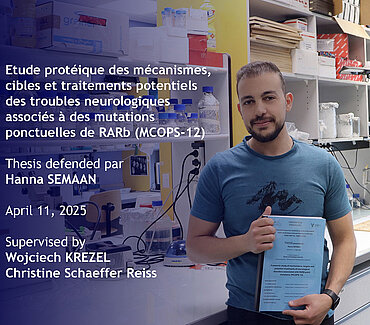Congratulations to Hanna SEMAAN on the acceptance of his thesis!
His work, supervised by Wojciech KREZEL and Christine Schaeffer Reiss,
is titled:"Proteomic Study of Mechanisms, Targets, and Potential Treatments of Neurological Disorders Associated with Point Mutations in RARb (MCOPS-12)"

Summary of his research:
Syndromic Microphthalmia 12 (MCOPS12) is a rare disease characterized by a spectrum of clinical symptoms, including intellectual disabilities and progressive motor disorders. MCOPS12 is caused by de novo point mutations in the gene encoding the retinoic acid receptor beta (RARβ), a mediator of vitamin A signaling critical for brain development and neuronal functions. The underlying pathophysiological mechanisms of this disease remain unknown, and no curative treatments are currently available. Consequently, the overarching objective of this thesis is to identify potential mechanisms contributing to the pathophysiology of MCOPS12 and subsequently propose pharmacological treatments to prevent or alleviate associated symptoms.
Specifically, this work uses proteomic approaches to analyze the impact of RARβ mutations on the composition of its protein complex and neuronal communication in the striatum. Our study identified enhanced glutamatergic and dopaminergic signaling in the striatum of MCOPS12 mouse models. Pharmacological modulation of these pathways showed beneficial effects in normalizing certain symptoms associated with the disease. Additionally, our results demonstrate that different RARβ mutations alter the composition of proteins interacting with RARβ in a mutation-specific manner. The disruption of interactions with coregulators, revealed in human neuroblastoma cell lines, may underlie impaired transcriptional control, leading to MCOPS12.
Skills Acquired at IGBMC:
Over three years of doctoral research in neuroscience, I gained significant personal and professional maturity, developing autonomy, scientific rigor, and adaptability. This experience immersed me in neurobiology research, exploring the complex mechanisms of the nervous system through a wide array of experimental approaches. I learned and mastered numerous techniques, including animal experimentation, dissection, primary cell culture, microscopy, proteomics, and other advanced methods. This technical diversity strengthened my laboratory versatility and enriched my overall understanding of brain function. These years were a genuine springboard, both scientifically and personally.
Life at IGBMC:
What I particularly appreciated at IGBMC was the stimulating and supportive scientific environment conducive to learning and exchange. Working at such a dynamic institute allowed me to thrive in a collaborative setting, surrounded by passionate researchers who were approachable and open to discussion. I enjoyed the richness of the seminars, the diversity of topics covered, and the access to cutting-edge technological platforms. IGBMC provided a setting where scientific rigor goes hand in hand with innovation while valuing the people behind the research. It is a place where I was able to grow both professionally and personally.
Collaboration:
- LSMBO team (IPHC)
- Dr. Jacques Michaud (Canada)
Funding and Partners:
- Neurex
- Institut du Médicament de Strasbourg (IMS)
Future Projects:
A one-year postdoctoral position in Wojciech KREZEL's team at IGBMC, followed by exploring new opportunities in research and teaching in France and Europe.
